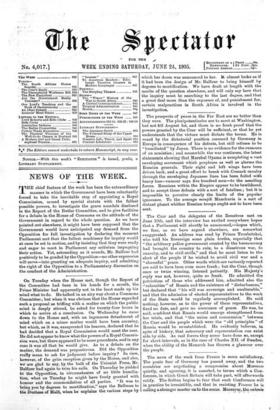On Tuesday when the House met, though the Report of
the Committee had been in his hands for a month, the Prime Minister had apparently not in the least made up his mind what to do. He talked in an airy way about a Commons Committee ; but when it was obvious that the House regarded such a, proposal as trifling with a matter on which the public mind is deeply stirred, he asked for twenty-four hours in which to arrive at a conclusion. On Wednesday he came down to the House and, with an ingenuous detachment of mind which on a minor matter would have been amusing, but which, as it was, exasperated his hearers, declared that he had decided that a Royal Commission would meet the case. He did not appear to know what the powers of a Royal Commis- sion were, but there appeared to be some precedents, and in any ease it was all that he would give. As to a debate on the matter, the demand was preposterous. Did the Opposition really mean to ask for judgment before inquiry ? In view, however, of the grim reception given by the House, and also, we are glad to say, by the bulk of the Unionist Press, Mr. Balfour had again to trim his sails. On Thursday he yielded to the Opposition, in 'circumstances of no little humilia- tion, what on Tuesday he might have freely granted with honour and the commendation of all parties. "It was to bring you by degrees to mortification," says the Bellman to the Duchess of Ma.lfi, when he explains the various steps by which her doom was announced to her. It almost looks as if it had been the design of Mr. Balfour to bring himself by degrees to mortification. We have dealt at length with the merits of the question elsewhere, and will only say here that the inquiry must be searching to the last degree, and that a great deal more than the exposure of, and punishment for, certain malpractices in South Africa is involved in the investigation.


















































 Previous page
Previous page